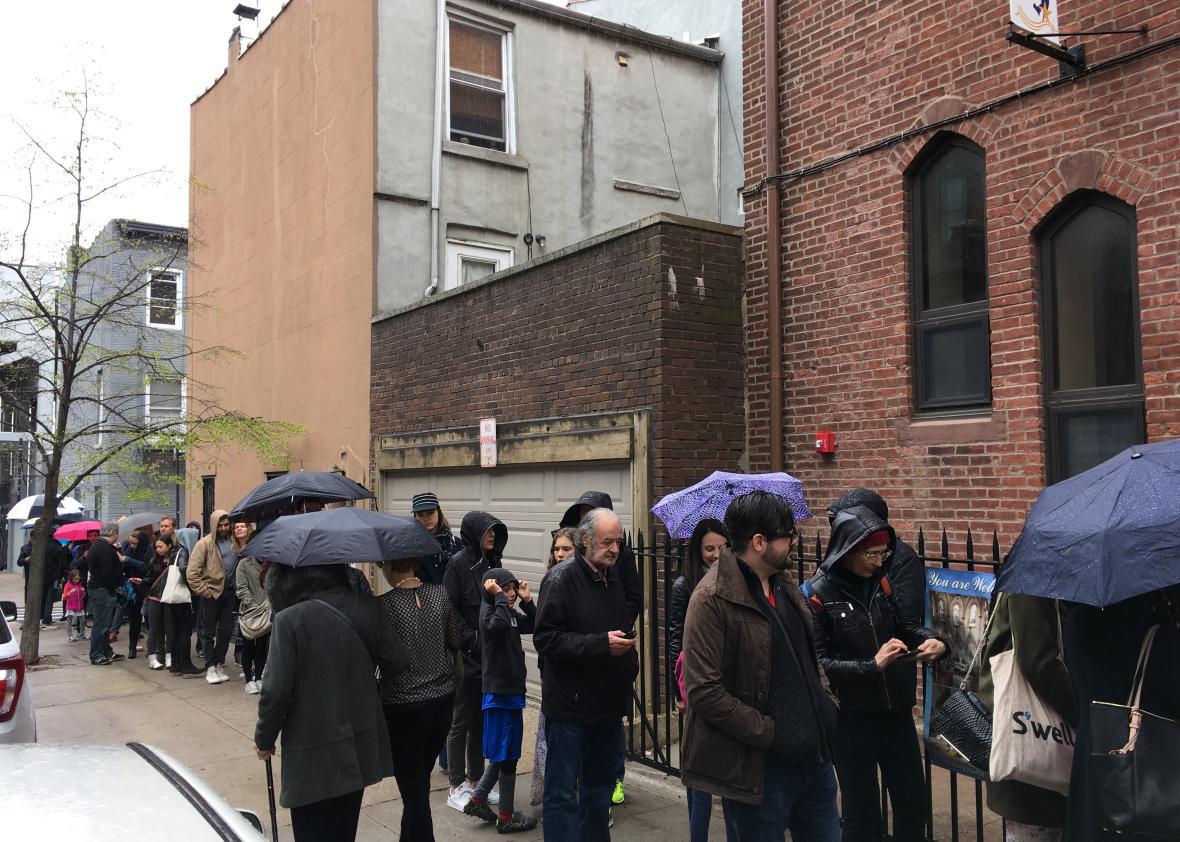BROOKLYN—Some of the first votes in the French presidential election, a referendum on the future of the European Union, were cast in an old red-brick church building near the Gowanus Canal on Saturday morning. On the sidewalk outside, some of the New York area’s 75,000-odd French citizens waited in the rain to choose between the 11 candidates for their country’s five-year presidential term.
The French diaspora in the Americas votes a day early, and unlike U.S. expats, they vote not by mail but in polling places across the hemisphere: the French Embassy in Buenos Aires, the French-American Academy of Jersey City, and here at the International School of Brooklyn in Carroll Gardens. (Sunday, their compatriots from Hanoi to Geneva will follow suit.)
Even in a city whose popularity with French tourists and expatriates is the subject of expressions (“Très Brooklyn!”) and department-store displays back home, the scene on Saturday morning was exceptionally Gallic, if a few Gauloises short of the Rue Oberkampf.
France’s scandal-plagued presidential campaign had no one in high spirits. There no were no pins or political T-shirts, except for one woman whose shirt read “Resist.” It was an American reference, but it neatly summed up the common political aim within the diversity of Brooklyn français: a determination to stop Marine Le Pen.
Le Pen, the National Front candidate whose brush with power will have altered the country’s politics even in defeat, is likely to proceed to a runoff vote in two weeks. But there was plenty of game theory being discussed among Brooklyn’s French population—whose bohemian-bourgeois lefty politics resemble those of their American neighbors—as to how she might be vanquished this weekend, eliminating what many French moderates consider a nightmare scenario: Le Pen against the anti–E.U., communist Jean-Luc Mélenchon.
Maybe the strategy was to attempt to boost the conservative François Fillon into the runoff, instead of padding the lead of the front-running centrist Emmanuel Macron. Or did that leave Macron vulnerable to the surging Mélenchon? One woman, who had arrived undecided, said it was the first time she had cried in the voting booth. She wouldn’t say whom she chose.
The scene made for a curious contrast with an American election, since the polling place brought together an entire urban diaspora. Everyone knew someone. And because it was Saturday, the tense prospect of an E.U. exit was dampened with the leisurely pace of a spring weekend. Kids on scooters raced up and down the sidewalk while their parents waited for the opportunity to stuff a candidate’s card into an envelope.
Expatriate communities tend to exert outsized influence back home, in part because immigrants are often wealthier and better educated than the families they leave behind. The French in Brooklyn are no exception; they all have good jobs. They have abandoned France, some in frustration, some for adventure, some for opportunity, but they desperately want to pull it back from radicalism. The delicate act of voting can feel like a feeble gesture for all that political willpower, a petty expression of an exile’s sense of wisdom.
Still, after living helplessly through the election of Donald Trump—whose presidency is threatening the H1-B visas so many of these émigrés depend on—this election was a welcome occasion to exercise their franchise. Volunteers like Morgan Collino, a French tech worker who got his visa on Nov. 8, were pointing voters in the right direction. Helping out was a kind of civic duty, Collino felt. Older folks said it was a longer wait than in past years.
The disturbing tenor of the campaign in France might even have been felt louder here, its signal boosted, perversely, by a distance that other aspects of life in France could not effectively traverse.
For Kim Long Pham, the father of two young Americans, Le Pen’s xenophobic rancor was reason enough to vote. Pham is from Dieppe, in Normandy, and as the son of Vietnamese immigrants, he was the only nonwhite kid in class. He fits right in in Brooklyn, as you might expect, where he has lived for 15 years. But Le Pen’s attacks felt personal.
“Especially when you’re far away, you feel it more closely, you feel more concerned,” said Tiphaine Brun, a gallerist from Lyon who works in Manhattan. Brun is worried about the program at her French university that had enabled her to study at Wagner College in Staten Island, opening the door to her life in New York. Like their counterparts in the United Kingdom, ambitious young French people have been born into a world without borders. That they live abroad can represent an embrace, not a rejection, of France’s openness. From 3,500 miles away, Brun was trying to hold that door ajar.
